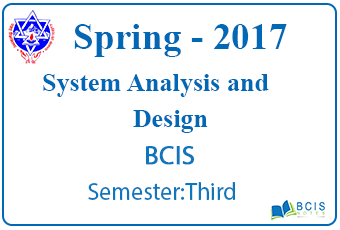
| Level: Bachelor | Semester – Spring | Year: 2017 |
| Program: BCIS | Full Marks: 100 | |
| Course: System Analysis and Design
|
Pass Marks: 45 | |
| Time: 3hrs. | ||
| Candidates are required to give their answers in their own words as far as practicable. |
| The figures in the margin indicate full marks. |
| Section “A”
Very Short Answer Questions Attempt all the questions. |
10×2 |
|
| 1. | Define an information system and information technology? | |
| 2. | What is a system analyst and what is his/her role in the system development process? | |
| 3. | Differentiate between system life cycle and system development methodology. | |
| 4. | What is a project management and what are the causes of project failure. | |
| 5. | What are the advantages and disadvantages of the Discovery Prototyping method? | |
| 6. | What is the functional and non-functional requirement? | |
| 7. | Define the terms: entity, attribute, primary key, and foreign key. | |
| 8. | What is the use of the Use Case Diagram? | |
| 9. | What is the in-house system development method? | |
| 10. | What is a process? Name three types of logical processes. | |
| Section “B”
Descriptive Answer Questions Attempt any six questions |
6×10 |
|
| 11. | Explain the building block of the Information System from every stakeholder’s viewpoint. | |
| 12. | What is system analysis? Explain the five phases of system analysis? | |
| 13. | List the methods of system development. Explain the RAD approach for system development with its phases. | |
| 14. | Define ER diagram. Construct an ER diagram for the university to record all the required data. Include relationship and cardinality on it. | |
| 15. | What are the seven Fact-Finding methods for requirement discovery? | |
| 16. | Explain the types of feasibility analysis and its benefits for the development of an information system. | |
| 17. | Explain the project management life cycle. | |
|
18. |
Section “C” Case Analysis Perfect Pizza wants to install a system to record orders for pizza and chicken wings. When regular customers call Perfect Pizza on the phone, their phone number goes automatically into the Pizza system. The phone number invokes the name, address and last order date come automatically on the screen. Once the order is taken, the total, including tax and delivery, is calculated. Then the order is given to the cook. A receipt is printed. Occasionally, special offer (coupons) is printed so the customer can get a discount. Drivers who make deliveries give customers a copy of the receipt and coupon (if any). Weekly totals are kept for comparison with last year’s performance. Answer the following questions 1. Draw a context flow diagram for Perfect Pizza. 2. Draw 0-Level DFD for Perfect Pizza. 3. Find the requirements for Perfect Pizza using a use-case diagram. |
5 10 5
|
You may also like: Numerical Methods || Spring 2017 || Pokhara University

Leave a Reply